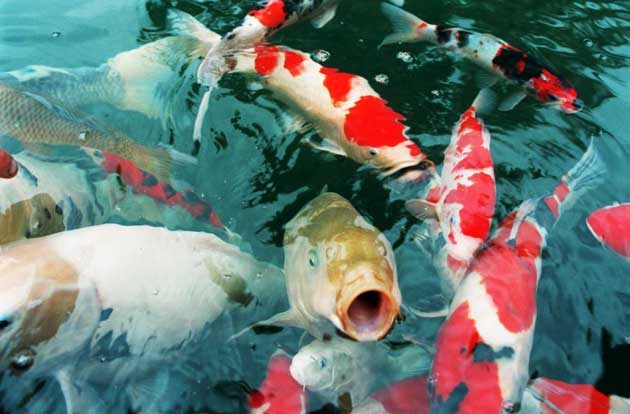Herpes virus ravages Koi carp population

An outbreak of a deadly disease that affects Koi carp has been confirmed after 60 of the fish died at one of Britain's most prestigious royal gardens.
The outbreak has forced the Department for Environment, Food and Rural Affairs to restrict the movement of fish in the Royal Horticultural Garden ponds at Hyde Hall, Essex, in a bid to prevent the highly contagious Koi herpes virus from spreading.
It is one of five restrictions in place in the UK to keep the virus under control, the others being in Kent, Derbyshire, Somerset and the West Midlands.
If the virus moves beyond the garden ponds, or any of the other areas, it could be disastrous for Koi owners across Britain. Once a fish is infected, experts say killing every other fish in the pond is the only way to stop the virus spreading. Carp enthusiasts would have to destroy thousands of pounds worth of Koi, which cost about £150 each.
The virus is similar to other forms of herpes and spreads through contact. A fish that comes into contact with water in which an infected fish has been swimming is susceptible to the virus, which has no cure.
A spokeswoman for RHS Hyde Hall confirmed that the gardens had been made the subject of a "designated area order", preventing the movement of any fish on to or off the site. The affected pond was ornamental and none of the fish was for sale.
As a precaution, all four RHS gardens in Britain have stopped accepting donations of fish.
"There are no implications for human health regarding the KHV disease and it only affects fish of the carp variety," she said.
"All it means is that we are not allowed to move the fish from the top pond, but we hadn't planned on doing that anyway."
Beckie Rodgers, the editor of Koi magazine, said that if the virus was contained there should be no threat to carp enthusiasts, but the virus was "quite a big problem". If it were to spread it would be bad for Koi keepers. "The problem is that people don't really know how it starts, but once it does it can kill all of your fish really quickly.
"There are symptoms, but even if a fish isn't showing symptoms it can carry the disease for years without being detected. Because of that risk, when one of your fish becomes infected you really have to kill them all, disinfect your pond and start again.
"The worst thing would be if Defra put restrictions on importing because Koi enthusiasts rely on being able to bring fish in from Japan," Ms Rodgers said.
The Defra spokeswoman said that no import restrictions were in place but they may be introduced later in the year should the outbreak worsen.
Symptoms of a deadly disease
* The first recorded case of KHV was reported in Israel in 1998. Since then cases have been confirmed in the United States, Europe and Asia.
* The disease has a mortality rate of 80 per cent and thrives in water temperatures of 22C to 27C.
* Symptoms include bleeding gills, sunken eyes and pale patches or blisters on the skin.
* Deaths usually occur within 48 hours of symptoms appearing and there is no known cure or licensed vaccine to treat the highly contagious virus.
* Quarantine is the only effective method to prevent the illness spreading and once one Koi is infected it is advisable to kill all other Koi in the pond as some may be carrying the virus without displaying symptoms.
* Goldfish and other fish in the carp family are not susceptible to Koi herpes virus.
Join our commenting forum
Join thought-provoking conversations, follow other Independent readers and see their replies
Comments
Bookmark popover
Removed from bookmarks